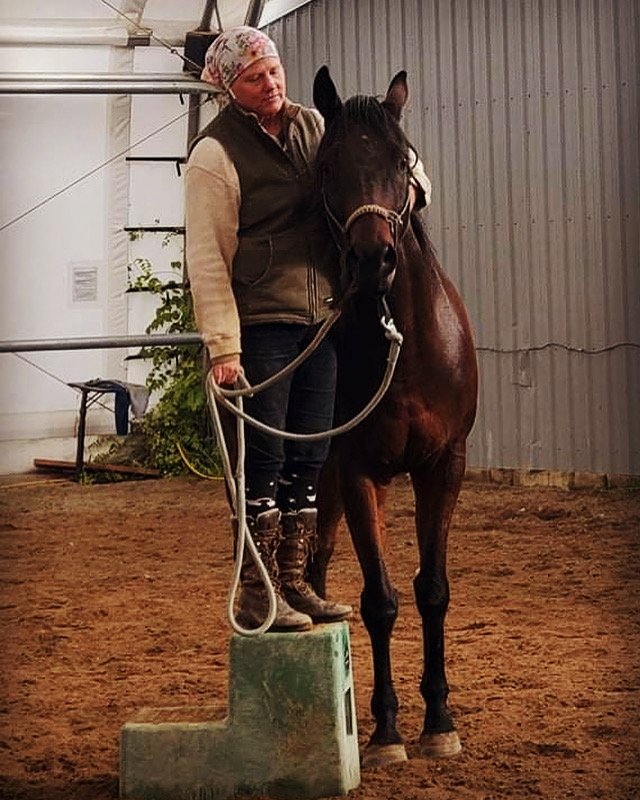I May Never Know
As I prepare to travel and teach another clinic, I realize how much I’ve changed. Grown? I hope so. Advanced my own abilities and understanding? I think so. I thought as I walked further through life I would become more comfortable. More confident. More able to say, “This way and no other.” It just doesn’t seem to be the case.
In some ways, I can say, “Not this way.” Why? Because I have seen the research from trustworthy sources. I have seen the physical damage in dissections. I have experienced the psychological repercussions in horses I try to bring back from trauma, fear, and anxiety. There clearly are methods that are physically and psychologically damaging. These I can dismiss out of hand with little thought. I’ve been there and done that.
Now I walk a misty path of education for horses that is beneficial and ennobling. Yet there are voices here as well shouting, “This way and no other!” Throwing around blanket statements as if they’re airing them out on laundry day. It gets disorienting, frustrating, and discouraging. In many ways, the folks along this path can be even more strident and judgmental than their “git er dun” counterparts. In a world where horses are objects, as long as the object functions as expected, all is well. So it’s a jovial kind of place, really. It can make your skin crawl with the methods used but no one is pointing fingers and shouting because you decide to use food rewards. Or not use food rewards…
I think I’ve come to at least a resting place on the journey. I can’t be other than I am. I was raised to “git yer damm horse broke.” That’s not a bad thing. It’s not a bad thing to have a horse that stands tied quietly, is tolerant of a lot of things going on, can do a lot of jobs in a lot of situations, is reliable and calm, and participates in the activity at hand at least in a neutral emotional state. “Nothing better to do on a Thursday,” kind of mentality. But getting to this place thoughtlessly using traumatizing, demeaning, neglecting, or extreme force is not something we need to do anymore. Not in the age of so much information and educational sources.
Yet there isn’t a clear consensus, and may never be, of what even the most horse-friendly educators can agree upon. We have more and more terminology and research but less understanding of one another. So I am left to work from my education and my experience and with “what do I want in my own personal horses?”
I want my horse to know what he needs to know before he needs to know it.
I want my horse to deeply believe he can find the answer.
I want my horse to feel physically better and mentally more clear and emotionally calm after each session.
I want my requests to be a part of a program that builds on itself, is consistent throughout and is versatile in its application. I like doing lots of things with horses!
I want my horse to want to interact with me. If my horse doesn’t choose me, why would he participate in our time together? Who wants to have a companion who simply tolerates you?
I want to listen and observe before I ask. Rinse. Repeat.
I want to try something with the understanding it may not work even though it “should.”
I want to have several things that I can try instead.
I want to continue taking in books and research because, by and large, it informs my work to a greater degree.
I want to understand that the horses haven’t read the books or the research. They are the experts on themselves and how they feel. That doesn't mean the books and research are useless, just that there are experiences that aren’t contained there.
I will insist my horse behave safely and if he’s incapable of behaving safely, I can insist he takes his unsafe behavior a safe distance away from me while we figure out a way to a calmer state.
I’ve come to realize that so many questions can be answered with both “yes” and “no.” It can be infuriating for people to ask me a question and that is my answer. Along with, “It depends on the horse. I’d have to talk to the horse.” “Yes, most horses prefer this approach. No, that one doesn’t like it at all.” “Many horses understand this introduction to this skill but this horse doesn’t understand. We will try this approach instead.”
I don’t think it had ever occurred to me that there are things I may never fully know. I’m so hungry for knowledge and I’ve had my hands on so many horses! There are still moments while teaching when I don’t have the answer. I have experience, education, and ideas, but maybe not the solution that’s going to work in a particular situation. I’m coming to be okay with that.
Not having the answer sometimes can be the bad news. The good news is there’s something more to learn. Coming to terms with not having answers has been hard. Letting go of “this way and no other” has been hard too. It feels safer when there’s a plan. Put the plan into action and it will work. Unless it doesn’t. Unless the person doesn’t understand or the horse is in a place where they don’t or can’t understand. Like my mom said, “Plans don’t guarantee outcomes.”
Put simply, there are things that I may never know. I’ll constantly keep learning, but I simply cannot expect myself or anyone else to know everything. Perhaps that’s where the real journey begins.

